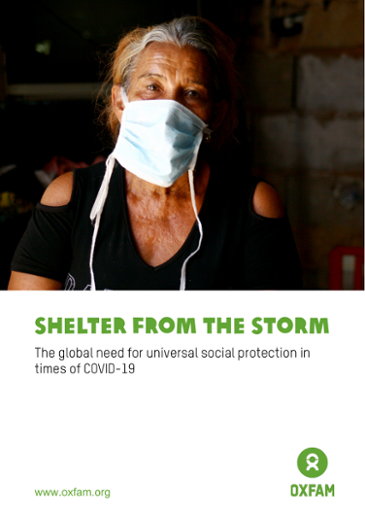
https://www.oxfam.org.nz/news-media/media-releases/2-7-billion-people-ha... Overall, the world has spent an additional $11.7 trillion this year to cope with the fallout from the coronavirus pandemic. Of this, $9.8 trillion (83%) was spent by 36 rich countries against just $42 billion (0.4%) in 59 low-income countries. On additional cash poured specifically into social protection programs, 28 rich countries have spent at the rate of $695 per person. In contrast, low-income and emerging countries have spent at a per capita rate of between $28 to as low as $4. To make matters worse, rich countries have only increased their aid to developing countries for social protection by $5.8 billion – the equivalent of less than five cents for every $100 raised to tackle Covid-19. “The coronavirus united the world in fear but has divided it in response,” said Oxfam Executive Director Gabriela Bucher. “The pandemic sparked a laudable global effort that reached more than a billion more people with social protection support over 2020 but, as of today, more people still have been left behind entirely. That need not be so.” The need for better social protection programs to help people is huge. Half a billion people are now under-employed or out of work, twice as many women affected as men. Workers in low-income countries have suffered most, losing 23% of their working hours. People are falling into debt, skipping meals, keeping children from school and selling their assets. Remittance flows from migrants to reliant families back home have collapsed. Global poverty and hunger are rocketing. However, the report finds: Bucher said that social protection is both a lifeline and a human right, and one of the most powerful and affordable investments to reduce inequality, vulnerability, poverty and need. “The case for overseas aid, progressive taxation and international solidarity has never been stronger, precisely because of this desperate time in which we are living through”. “All this because inequality is a hard-wired design feature rather than design fault of our global economic system. Millions of desperate people see precious little relief ahead without urgent action,” Bucher said. Years of under-investment and often discredited advice – such as harsh and arbitrary means testing – have left most developing countries with shallow or broken social protection programs and exposed to the pandemic’s worst consequences. “Oxfam has reached 11.3 million people through our Covid response programming around the world however, as much as civil society is mobilizing together strongly, with local partners and community leadership to the fore, the scale of people’s need is overwhelming and growing”. The report illustrates stories like Sovann Vary’s, a single mother who borrowed $5,000 to buy a tuk-tuk when her job as a domestic cleaner ended. She is struggling to repay and is ineligible for the social insurance scheme set up by her Cambodian government. And informal garment worker Brenda Carolina whose family now depends upon sporadic food aid after she was rejected for support, despite the Guatemalan government’s efforts to increase its coverage. “We’re hearing hundreds of stories like Vary’s and Brenda’s, every day,” Bucher said. “There is still time for developing country governments to step up their support for people by increasing taxes on the richest to pay for decent universal social protection programs. They have to show the will. And still time for rich nations to increase their aid and currency reserves, and cancel their debts, to help them afford it.” Oxfam is calling for a Global Fund for Social Protection to avert a huge increase in global inequality and poverty, as a keystone toward a more equal and resilient post-Covid economy. Governments should commit an additional 2% of their GDP into social protection programs and ensure minimum income security for children, the elderly, mothers, and people living with disability. “An unprecedented investment is now required,” Bucher said, “one that bravely meets the crisis head on. One that learns from the most successful countries.” -ends- For more information, please contact: Notes to editor: Prior the coronavirus pandemic, up to 4 billion people lacked of social protection, according to ILO (World Social Protection Report 2017-19). The World Bank estimates that 1.3 billion have been reached since with social assistance cash transfer coverage expansion. Source WB: U. Gentilini et al. (2020). Social Protection and Jobs Responses to COVID-19. About 2.7 billion people have consequently been left behind.
Kelsey-Rae Taylor on Kelsey-Rae.Taylor@oxfam.org.nz or +6421 298 5894.
- 2339 reads










Add new comment